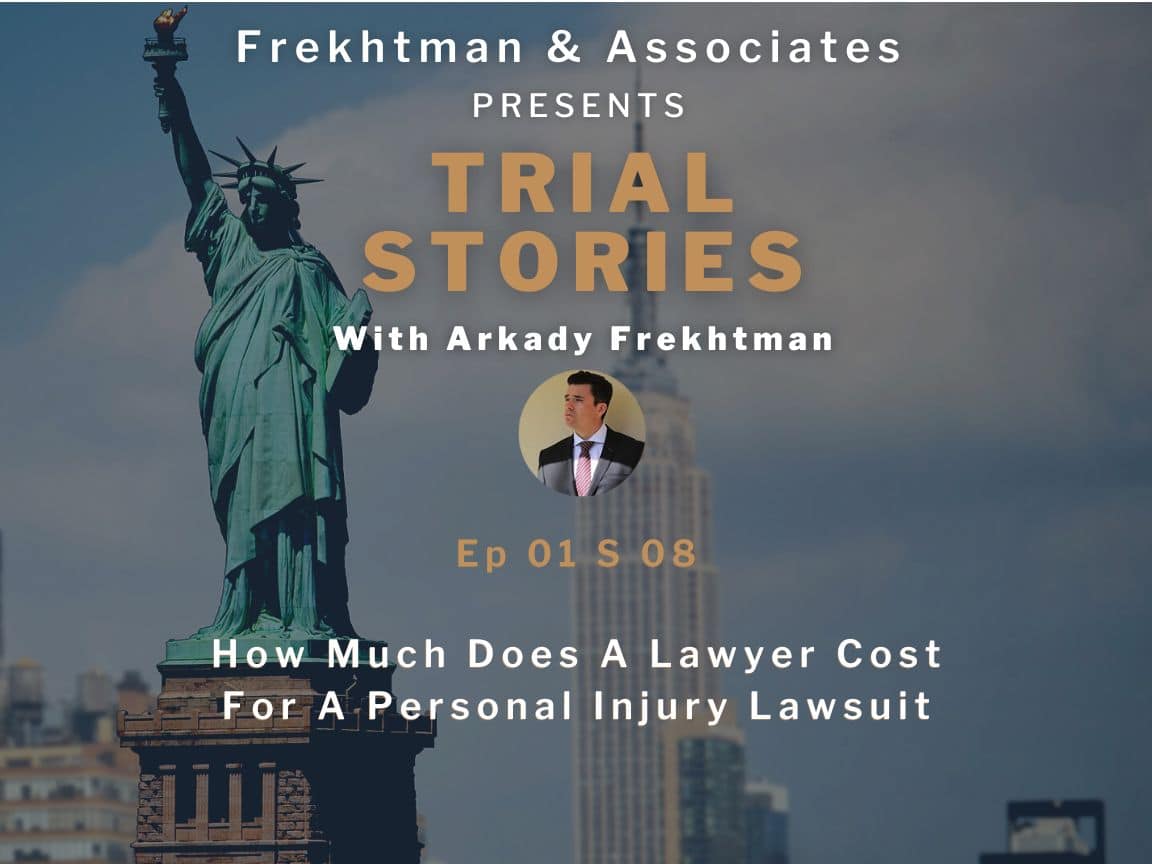EP 01 S 08: How Much Does A Lawyer Cost For A Personal Injury Lawsuit

The cost of your lawyer will be based on the reason why you need a lawyer, let’s talk about the real cost of a personal injury lawyer!
Pick Your Favorite Channel: Apple Podcast | Google Podcasts | Spotify | Stitcher | RSS
Full Transcript
Hi everybody. This is Arkady Frekhtman, a New York City personal injury trial attorney. And I’m coming to you for my

And he said, “How do I know you’re not going to hire your friends, or a double dip, or get some kind of kickbacks and start spending a lot of money for no reason just to make more of the fee?” And first of all, nobody, hopefully, would ever do that. That’s very unethical and illegal. But the point is that you can’t know what the expenses would be. So what he wanted was he wanted to cap the expenses. And I said, “Look, in a case like this, a trip and fall. Usually, the expenses will be from 1,000, maybe to 5,000 on average. That’s if we do not go to trial.” Because what are expenses? Usually, it’s things like filing a lawsuit is $210, a request for judicial intervention to have a judge assigned costs $95. If you ever make a motion that costs $95, things like that. If you take a deposition, that might cost a few hundred dollars, depending on the length of the transcript. If you get medical records, if there are a lot of medical records, that could cost a few hundred dollars.
Contact our team at (212) 222-1111 for your free case evaluation.
I just saw a case recently where I settled the case for nearly $2 million, but it had a $551.79 medical record bill because it had extensive injuries. That case involved many elbow surgeries and the medical records were so expensive. So it just depends. Now concerning his case, his wife fell on this crack outside their building. So I would want to hire a construction safety engineer to examine it, to find all the building code violations. And that engineer may write a 50-page report with all of these codes. Now that costs money because the engineer has to go out there, he has to spend hours examining it, and then he has to spend hours writing a report. That might cost me $2,500.
Now, if I don’t do that, I cannot do that. I could just try to get on the phone and settle it for him or for her actually because it’s his wife. But what’s going to happen is I bet you, the insurance company will offer much less money. So if I try to settle it without spending the 2,500, they might say, you know what? We’ll just give you like 50,000. But if I have the engineering expertise and I say, “Look, if you don’t settle it for 500,000, I’m confident to go to trial because I have this engineering safety expert who’s going to get me all the violations that you’ve committed. Look at all these violations. I have a 50-page report.” Now, boom. I could command the 500,000 rather than settling for 50. And the difference is what did I spend? Like 2,500 bucks to do that, to go from 50 to 500. You see? So you could use expenses as a sword to do better for the client.

Now in some states, you could fund litigation. You could start a law firm, even if you are not a lawyer. For example, in Arizona, I believe just recently they passed that rule and they’re looking to pass it in California as well. But in New York, we do not have that rule. In New York, the lawyer has only to advance the money and then get the money back. So this client was upset. He was saying, “Well, I don’t want to spend,” I think he didn’t want to spend anything. He said, “Look, if you guys are taking a third, 33.3%, that’s a big chunk. That’s a big piece of the pie. So then I don’t want to spend any money on expenses.”
So what I offered him is I said, “Look, if it’s a big issue for you, I don’t see it as an issue.” And I even gave him an example. I said, “Look, if we were to settle the case, for example, hypothetically, for a quarter of a million dollars, $250,000, and I had $2,500 in expenses, the net amount to the client after deducting the expenses would be $165,000.” Now, if the same case, if I had zero expenses, I spent nothing impossible because you have to file a lawsuit and do things. But just hypothetically, if I spent nothing, the net amount to the client would be $166,000. So it’s only 1,000 more. So it doesn’t make a financial difference. But he was just so staunch and so like, “I don’t want to have any expenses.” So the way that a lawyer could ethically do it is by lowering their legal fees.
So, for example, instead of charging 33.3%, a lawyer could charge 32%, and charging 32% on 250,000, the same example means that the client would get 2,500 more. And that way, the lawyer would still front the expenses, and take the expenses back. But because he’s charging a smaller percentage, which is allowed, that 2,500 would get given back to the client via the smaller percentage of the legal fee.
So yeah, so that’s basically like the types of things that we have to deal with, like thinking about all of these things. And so with a lawsuit, you have the contingency fee, meaning no win, no fee. The lawyer has to take the case free of charge, and spend all the money. So you have to have a lot of money in the bank or access funds. Then you have to get the result for the client, like a million dollars, $100,000, whatever it is, you take your third off the result, you give the rest to the client, and the expenses just come off the top usually. So the expenses are an integral part like I was explaining before, of the case because if you don’t have any expenses or if you just can’t handle the case, you need to.

But typically, expenses run in that range, from like 1,000 on the really small cases, maybe less than 1,000 to like a few thousand, like 3,000, 4,000. Usually, they don’t go over 5,000. The only time expenses can get much larger is when you have a trial because a trial is different. Now 99 or 95% of cases don’t go to trial. Most cases settle. But if you do go to trial, now you have to ask that doctor, for example, in that same case, where his wife fell, she had surgery, she had a trimalleolar ORIF, an Open Reduction Internal Fixation.
So now I have to ask that doctor to cancel all his patients, and all his surgeries and come to court and be in court from 8:00 AM to 5:00 PM to be available for a direct examination, to talk about all the medical records and cross-examination. And sometimes, hey, the defense lawyer can on purpose, delay the cross-examination to bring him back a second day. So for that, the doctor might say, you know what? I want 5,000. I want 10,000. Some doctors even charge 15,000 to do that. And so there is where you can have a lot of expenses if you have a trial, let’s say with multiple doctors, you could be spending $50,000 easily. And that’s just up to the lawyer and the client. If you feel the case is worth it, that you have a shot at winning, you could advance those costs.
And if you lose, the lawyer just loses all those costs. No one is ever going to go after the client for those costs. So that’s just the loss that the lawyer has to eat. And that’s part of the risk of being a trial lawyer, a personal injury trial lawyer in New York City. That’s just one of the risks.
Now the same thing happens in medical malpractice. In medical malpractice, you might have to have other doctors review the medical records and everything, and maybe even do an exam of the client to see if there was a mistake if there was medical negligence. If there was, they’d give you a report, and they’ll say, I’ll be your expert. But to do that, you might have to spend $5,000 because they’re spending their time. You might have thousands of pages of medical records that this doctor expert has to review. That’s not cheap. And then that doctor will have to come to court and talk about the departures from good and accepted medical practice that the defendant committed, how the defendant was negligent. So that is going to cost another 10,000 a day. So medical malpractice cases can get very expenses. The expenses on medical malpractice cases can easily be 50,000 or more.
So I hope this has been helpful. It’s just a little bit of an explanation about how lawsuits work and the cost of a lawyer because the cost of a lawyer is the legal fee, the contingent fee, the percentage, whether it’s 33 or 32 or 30 or whatever. Some lawyers will say, “Hey, I’ll do it for 25” to try to undercut and get more cases. But usually, those lawyers aren’t like the best lawyers. Usually, they’re just going to get on the phone and whatever they get offered, they’re just going to tell you to take. So it’s better to spend a little bit more, but then you get better service and then you get better results just like with anything. And then of course, all of the expenses, like we talked about, are for simple things like medical records or postage filing fees. And then the only big expenses are when you have to go to court and pay doctors or pay experts.
So I hope this has been helpful. Let us know what questions you have about the cost of a lawyer in a personal injury lawsuit, expenses, about liens, about funding, about any questions that you have. Please like and subscribe to our channel, hit that little notification bell so that you get notified of new videos. We’re going to try to do one or two videos every week. And I think very soon, hopefully in August, I’m going to start doing the lives where I go live, and then you can just jump in and put comments, and then I can answer your comments live on YouTube. Okay, everyone, have a great day; thank you for watching, and all the best. Bye-bye.
Video Version:

Contact our team at (212) 222-1111 for your free case evaluation.




